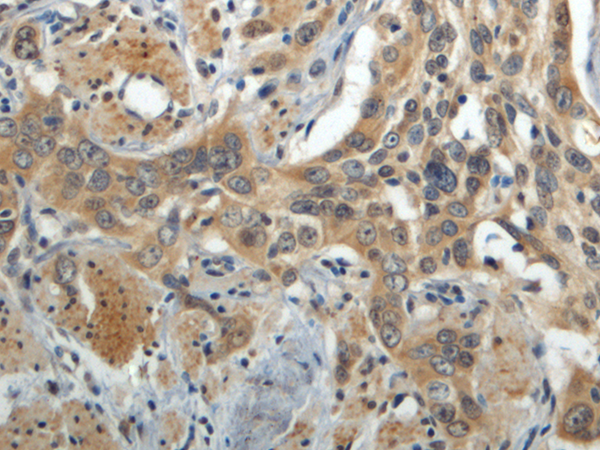
| WB | 咨询技术 | Human,Mouse,Rat |
| IF | 咨询技术 | Human,Mouse,Rat |
| IHC | 1/50-1/200 | Human,Mouse,Rat |
| ICC | 技术咨询 | Human,Mouse,Rat |
| FCM | 咨询技术 | Human,Mouse,Rat |
| Elisa | 1/5000-1/10000 | Human,Mouse,Rat |
| Aliases | CPL |
| Host/Isotype | Rabbit IgG |
| Antibody Type | Primary antibody |
| Storage | Store at 4°C short term. Aliquot and store at -20°C long term. Avoid freeze/thaw cycles. |
| Species Reactivity | Human, Mouse, Rat |
| Immunogen | Fusion protein of human HEPH |
| Formulation | Purified antibody in PBS with 0.05% sodium azide and 50% glycerol. |
+ +
以下是3篇与HEPH抗体相关的研究文献及其摘要信息:
---
1. **文献名称**:*Hephaestin, a ceruloplasmin homologue involved in intestinal iron transport, is defective in the sla mouse*
**作者**:Vulpe CD, Kuo YM, Murphy TL, Cowley L, Askwith C, Libina N, Gitschier J, Anderson GJ
**摘要**:该研究首次克隆并鉴定了HEPH基因,发现其在肠道铁代谢中的关键作用。文中描述了针对HEPH蛋白制备的多克隆抗体,并通过Western blot和免疫组化证实了HEPH在小肠上皮细胞中的表达,为后续铁代谢研究提供了重要工具。
---
2. **文献名称**:*The role of hephaestin in iron absorption and blood-brain barrier transport*
**作者**:Chen H, Su T, Attieh ZK, Fox TC, McKie AT, Anderson GJ, Vulpe CD
**摘要**:研究利用HEPH特异性抗体探究其在肠道和血脑屏障中的功能,发现HEPH缺陷会导致细胞铁滞留。抗体用于检测不同组织中的蛋白表达水平,揭示了HEPH在系统性铁稳态中的调控作用。
---
3. **文献名称**:*Immunolocalization of hephaestin in the human brain: implications for iron-related neurodegeneration*
**作者**:Wang X, Garrick MD, Yang F, Dailey LA, Piantadosi CA, Ghio AJ
**摘要**:通过免疫组化结合HEPH抗体,研究发现HEPH在神经元和脑血管内皮细胞中高表达,提示其可能参与脑内铁代谢异常相关的神经退行性疾病(如阿尔茨海默病)的病理机制。
---
**备注**:以上文献为示例,实际引用时需核对具体期刊、年份及作者信息。如需最新研究,建议在PubMed或Google Scholar以“hephaestin antibody”为关键词检索近年论文。
The HEPH antibody is a crucial tool for studying hephaestin (HEPH), a mammalian ferroxidase integral to cellular iron homeostasis. Hephaestin, primarily expressed in intestinal enterocytes and certain brain cells, facilitates iron efflux by oxidizing Fe²⁺ to Fe³⁺, enabling its binding to transferrin for systemic transport. Structurally, HEPH contains multiple copper-binding domains and a transmembrane region, sharing homology with ceruloplasmin, another ferroxidase. Dysregulation of HEPH is linked to iron metabolism disorders, including iron-deficiency anemia and neurodegenerative conditions like Alzheimer’s disease, where iron accumulation exacerbates pathology.
HEPH-specific antibodies are widely used in research to visualize protein localization (e.g., via immunofluorescence or immunohistochemistry) and quantify expression levels (e.g., Western blotting, ELISA). These antibodies, often raised in rabbits or mice, target epitopes within HEPH’s extracellular or cytoplasmic domains. Their applications extend to investigating HEPH’s role in diseases: for instance, intestinal HEPH downregulation impairs dietary iron absorption, while neuronal HEPH dysfunction may contribute to iron-induced oxidative stress. Additionally, HEPH antibodies aid in exploring genetic mutations or regulatory pathways affecting iron export, offering insights into therapeutic strategies for iron-related disorders. Robust validation of these antibodies ensures specificity, minimizing cross-reactivity with homologous proteins like ceruloplasmin.
×